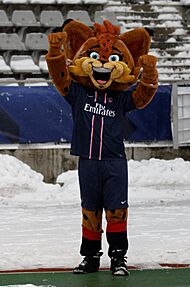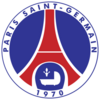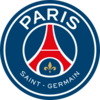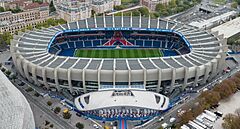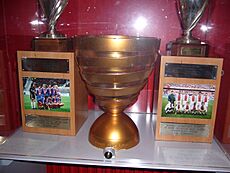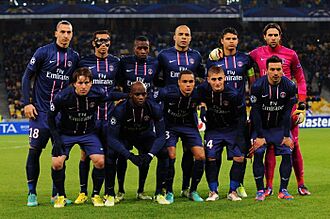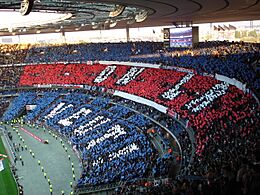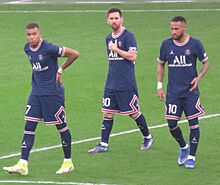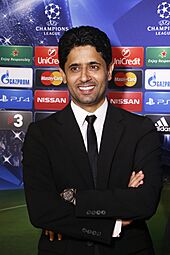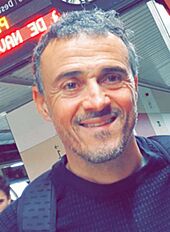Paris Saint-Germain FC facts for kids
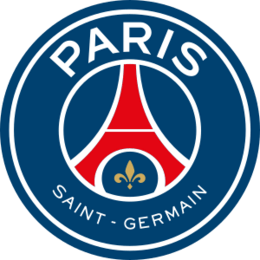 |
||||
| Full name | Paris Saint-Germain Football Club | |||
|---|---|---|---|---|
| Nickname(s) | Les Parisiens (The Parisians) Les Rouge-et-Bleu (The Red-and-Blues) |
|||
| Short name | PSG, Paris, Paris SG | |||
| Founded | 12 August 1970 | |||
| Ground | Parc des Princes | |||
| Capacity | 47,929 | |||
| Owner | Qatar Sports Investments (87.5%) Arctos Partners (12.5%) |
|||
| President | Nasser Al-Khelaifi | |||
| Head coach | Luis Enrique | |||
| League | Ligue 1 | |||
| 2021–22 | Ligue 1, 1st of 20 (champions) | |||
|
||||
Paris Saint-Germain Football Club, often called Paris Saint-Germain or simply PSG, is a famous French professional football club. It is based in Paris, France. The club started in 1970 when two teams, Paris FC and Stade Saint-Germain, joined together. Today, PSG plays in Ligue 1, which is the top football league in France.
PSG plays its home games at the Parc des Princes stadium in Paris. This stadium can hold 47,929 fans. With an amazing 56 trophies, PSG is the most successful club in France. It is also the most popular football club in France and has many fans around the world. PSG has a big rivalry with Marseille, and their matches are called Le Classique.
The team won its first major trophy, the Coupe de France, in 1982. They then won their first Ligue 1 title in 1986. The 1990s were a very successful time for the club. They won their second league title in 1994 and their first European trophy, the UEFA Cup Winners' Cup, in 1996. After a quieter period in the 2000s, PSG became very strong again in the 2010s. This happened when Qatar Sports Investments bought the club.
With a lot of investment, PSG won many league titles and national cups. They became a regular team in the UEFA Champions League. In 2025, they won their first Champions League title. This was part of a huge achievement called a continental treble, meaning they won three major competitions in one season.
PSG has won 52 trophies in France. These include a record 13 Ligue 1 titles, one Ligue 2 title, a record 16 Coupe de France, a record 9 Coupe de la Ligue, and a record 13 Trophée des Champions. On the international stage, they have won five trophies. These are the Champions League in 2025, the Cup Winners' Cup in 1996, the UEFA Intertoto Cup in 2001, the UEFA Super Cup in 2025, and the FIFA Intercontinental Cup in 2025. PSG is one of only two French clubs to win a major European title. They are also the first French club to win the continental treble and to be considered a world champion.
Since 2011, PSG has been mostly owned by Qatar Sports Investments. This is an investment fund supported by the Qatari government. By 2012, they owned 87.5% of the club. An American investment firm, Arctos Partners, owns the remaining 12.5%. PSG is the richest club in France and one of the wealthiest in the world. In January 2025, PSG had the third-highest income in football. They earned €806 million, according to Deloitte. They were also the world's seventh-most valuable football club, worth $4.4 billion, according to Forbes.
Contents
Club History and Achievements
How Paris Saint-Germain Started
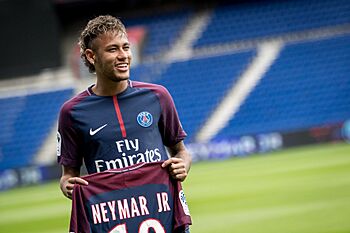
Paris Saint-Germain was created in 1970. This happened when two clubs, Paris FC and Stade Saint-Germain, merged. PSG quickly made a name for itself. They won Ligue 2 in their first season and moved up to Ligue 1. However, the club split in 1972. Paris FC stayed in the top league, while PSG went down to Division 3. After two quick promotions, PSG returned to the top league in 1974. They also moved into their new home, the Parc des Princes.
Winning First Trophies
The club won its first trophies in the 1980s. Players like Safet Sušić, Luis Fernandez, and Dominique Rocheteau led the team. PSG won the Coupe de France twice in a row in 1982 and 1983. They also won their first Ligue 1 title in 1986. After a difficult period, Canal+ took over the club in 1991. This brought new energy to PSG. With stars like David Ginola, George Weah, and Raí, the club won nine trophies in the 1990s. They also reached five European semi-finals. PSG won their second league title in 1994. They also won the UEFA Cup Winners' Cup in 1996, with Luis Fernandez as manager.
Modern Era and Global Success
In the early 2000s, PSG faced some challenges. Even with talented players like Ronaldinho and Pauleta, they struggled to reach the top. They won five more trophies during this time. These included three Coupe de France, a Coupe de la Ligue, and a UEFA Intertoto Cup. In 2006, Canal+ sold the club to Colony Capital. However, the team's performance did not improve much. PSG spent the next two seasons trying to avoid being relegated from the top league.
Everything changed when Qatar Sports Investments became the owners in 2011. Since then, PSG has invested a lot of money in signing world-class players. These players include Zlatan Ibrahimović, Lionel Messi, Neymar, and Kylian Mbappé. Neymar and Mbappé were among the most expensive transfers in football history. Because of this investment, PSG has dominated French football. They have won 37 trophies, including eleven league titles. They also regularly reach the knockout stages of the UEFA Champions League. PSG reached the Champions League final for the first time in 2020. They then won their first title in 2025. As Champions League winners, PSG also played in the final of the 2025 FIFA Intercontinental Cup. They beat Flamengo 2-1 in a penalty shootout to become world champions.
Club Identity
Team Colours and Mascot
Since it was founded, Paris Saint-Germain has represented both the city of Paris and the nearby royal town of Saint-Germain-en-Laye. This is why red, blue, and white are the club's traditional colours. Red and blue are the colours of Paris. They represent important historical figures like Lafayette and Jean Sylvain Bailly. White is a symbol of French royalty and Saint-Germain-en-Laye.
On the club's badge, the Eiffel Tower in red on a blue background represents Paris. The fleur de lys in white is a symbol of Saint-Germain-en-Laye. It is also a royal symbol, reminding us that French King Louis XIV was born there. PSG has had several badges over the years, but all of them have used these three historical colours.
The club's most famous jerseys have been mainly red, blue, or white. They always include the other two colours as well. PSG's official mascot is Germain the Lynx. He also wears the club's traditional colours. Germain was introduced in 2010 to celebrate the club's 40th anniversary. You can often see him entertaining kids in the stands or near the field during warm-ups at the Parc des Princes.
Team Songs and Slogans
"Allez Paris!" was the club's first official song. Belgian singer Annie Cordy recorded it in 1971. She was a big PSG fan and helped the club get started in 1970. A year later, she became PSG's official godmother.
The club's second song, "Allez Paris-Saint-Germain!" by Les Parisiens, was recorded in 1977. Its chorus became a popular chant among PSG fans during matches. A new version of this song was made in 2010 for the club's 40th anniversary. It uses the tune of "Go West" by the Village People. The words were changed with ideas from the fans. This is the club's current official song.
"Ô Ville Lumière" is another important song for PSG fans. It uses the tune of "Flower of Scotland". Other popular chants include "Le Parc est à nous" ("The Parc is ours"), "Ici, c'est Paris" ("This is Paris"), and "Paris est magique" ("Paris is magical"). The song "Who Said I Would" by Phil Collins has been played when players enter the field since 1992.
"Ici, c'est Paris" and "Paris est magique" are also the club's most famous slogans. "Ici, c'est Paris" was created by a fan group. The club started using it in their marketing. After some discussions, the club and fans agreed that both could use the slogan freely.
Famous Jerseys
For its first three seasons, Paris Saint-Germain's home jersey was red. It had blue and white details on the sleeves and collar. This design brought together the club's three colours: red and blue for Paris and white for Saint-Germain-en-Laye. In the 2010–11 season, PSG wore a red jersey for home games to celebrate its 40th anniversary. French fashion designer Daniel Hechter became PSG's president in 1973. He designed the club's classic home kit that same year. It was a blue jersey with a red vertical stripe, surrounded by two thinner white stripes.
This "Hechter shirt" was first worn in the 1973–74 season. It has been PSG's classic look ever since. The famous jersey was first used in a match against Red Star in November 1973. This was also the club's first game at the Parc des Princes. PSG won 3–1. Famous PSG players from the 1990s and 2000s, like Raí, Ronaldinho, and Pauleta, are known for wearing this kit. In this jersey, the club reached five European semi-finals between 1993 and 1997. They also won the UEFA Cup Winners' Cup in 1996.
It is thought that Hechter based his design on the red and white jersey of Ajax. Ajax was a very strong team in Europe at that time. However, Hechter said he was inspired by the Ford Mustang car. He put the car's hood stripes onto the jersey, using the three club colours. The Hechter jersey has two other versions. The "Reverse Hechter" (red-white-blue-white-red) started in the 1974–75 season. The "White Hechter" (white-blue-red-blue-white) first appeared in the 1994–95 season.
However, PSG's first great team wore a distinctive away kit. In this white jersey, they won their first Coupe de France titles in 1982 and 1983. They also played in Europe for the first time in 1983 and won their first Ligue 1 title in 1986. This white jersey had blue and red vertical stripes down the left side. It first appeared in the 1973–74 season as the away kit. From 1981 to 1990, this white jersey became the club's home kit. It is now known as the "Borelli shirt." It is linked to PSG legends from the 1980s, such as Safet Sušić, Luis Fernández, and Dominique Bathenay.
Badge Changes Over Time
When Paris FC (PFC) and Stade Saint-Germain merged to form Paris Saint-Germain, the club's first badge was the same as the original PFC logo. It showed a blue football and a red sailing ship. This ship is a symbol of Paris and is on the city's coat of arms. After PSG separated from PFC in 1972, they needed a new badge. The club's second badge became the basis for the one we know today. It featured the Eiffel Tower in red against a blue background. Below it were two white symbols of Saint-Germain: a fleur-de-lis and the cradle of Louis XIV. This badge was first used in 1972.
In 1982, a picture of the club's stadium, the Parc des Princes, was added to the bottom of the badge. It stayed there until 1990. In 1992, the club's owners, Canal+, changed the badge a lot. The new design had the letters "PSG" in white on a blue, white, red, white, and blue background. This looked like the Hechter shirt. Below it, "Paris Saint-Germain" was written in white on a black background. Fans wanted the traditional badge back, and it returned in 1995. It had "Paris Saint-Germain" above the tower and "1970" (the founding year) below the cradle. In 2002, it was slightly changed with a darker blue colour.
In 2013, the club's Qatari owners redesigned the traditional badge significantly. Now, the word "Paris" is written in large, bold white letters above the Eiffel Tower. This clearly highlights the "Paris" brand. Below it, "Saint-Germain" is written in smaller letters beneath the fleur-de-lis. The cradle of Louis XIV and the founding year "1970" were removed. A club official explained that they wanted to emphasize "Paris" more.
Friendly Tournaments Hosted by PSG
Paris Saint-Germain used to host two famous football tournaments. These were the Tournoi de Paris and the Tournoi Indoor de Paris-Bercy. The Tournoi de Paris was considered the most important friendly tournament in French football. It was even seen as a starting point for bigger international competitions like the Intercontinental Cup and the FIFA Club World Cup. PSG started organizing it in 1975 and won it a record seven times. This tournament was held at the Parc des Princes. The last one was in 2012. The Tournoi Indoor de Paris-Bercy was an indoor football tournament. PSG started it in 1984, and it was held every year until 1991. PSG won this trophy twice, more than any other club.
Home Grounds and Training Facilities
PSG's Stadiums
Since it began, Paris Saint-Germain has played in five main stadiums. These include the Stade Jean-Bouin, the Stade Georges Lefèvre, the Stade Bauer, the Stade Yves-du-Manoir, and the Parc des Princes. The Parc des Princes is their current home. PSG played its first match at the Parc des Princes on November 10, 1973. This was against Red Star. PSG officially moved into the stadium in July 1974 when they returned to Ligue 1.
Since then, the Parc des Princes has been PSG's home stadium. The season with the most fans was 2024–25. An average of 47,639 people came to the stadium for each match. The record for most fans at a PSG match was 49,575. This happened on March 13, 1983, when PSG played against Waterschei in a European cup game. PSG won that match 2–0.
Training Facilities for the Team
Campus PSG, located in Poissy, has been the club's training ground since 2023. The club owns and funds this facility. It is home to the men's football team, the women's football team, and the football academy. It also hosts the handball and judo teams and their academies. Campus PSG is planned to include a stadium that will complement the club's main stadium, the Parc des Princes. PSG's male team moved to Campus PSG on July 10, 2023. They had their first group training session there on July 18, 2023. Their first game was on July 21, 2023, a friendly match against Le Havre, which PSG won 2–0.
Camp des Loges, located in Saint-Germain-en-Laye, was the club's training facility from July 1970 until July 2023. Its main stadium, the Stade Georges Lefèvre, was the home ground for the men's team between 1972 and 1974. Camp des Loges also hosted the training sessions for the club's academy and women's team until January 2024. The men's team moved to Campus PSG in July 2023. The academy and women's team followed in January 2024. However, Camp des Loges remains the main office for the Association Paris Saint-Germain, as it has been since 1970.
Team Statistics and Records
Amazing Club Records
Paris Saint-Germain holds many records. They are the most successful French club in history with 56 official titles. They hold records in all French competitions. These include 13 Ligue 1 titles, 16 Coupe de France, nine Coupe de la Ligue, and 13 Trophée des Champions. They also won one Ligue 2 title. Internationally, PSG has won one UEFA Champions League, one UEFA Super Cup, one UEFA Cup Winners' Cup, one UEFA Intertoto Cup, and one FIFA Intercontinental Cup. They have also won 24 unofficial titles, including a record seven Tournoi de Paris.
PSG's win in the 1995–96 UEFA Cup Winners' Cup made them the only French club to win that trophy. They are one of only two French teams to win a major European competition. By winning the 2024–25 UEFA Champions League title, they became the first French club to win the continental treble. This means they won three major trophies in Europe in one season. They also achieved the continental quadruple. They were also the first French team to win the UEFA Super Cup in 2025. PSG is also the first and only French club to win a club world championship. In France, PSG has won four trophies in one season on four occasions. They have also won the domestic double and the domestic treble multiple times.
The Parisians have played the most consecutive seasons in the top league (51 seasons in Ligue 1 since 1974–75). They are the only team to win the Ligue 1 title while leading the table from the very first game to the last (2022–23). They also won the Coupe de France without letting in a single goal twice. PSG won five Coupe de la Ligue in a row (2014–2018) and four Coupe de France in a row (2015–2018). They also won eight consecutive Trophée des Champions (2013–2020).
Important people and players in the club's history include president Nasser Al-Khelaifi and manager Laurent Blanc. Marquinhos has played the most games for the club. Kylian Mbappé is the top scorer. Ángel Di María has the most assists. Bernard Lama has the most clean sheets. Thiago Silva was captain for the longest time. Ballon d'Or winners George Weah and Lionel Messi also played for PSG. Neymar was a world-record transfer player.
PSG's Seasons in Football
Paris Saint-Germain has played 55 seasons in total. 52 of these seasons have been in Ligue 1, the top division of French football. In the other three seasons, the club played twice in the second division, Ligue 2, and once in the third division, Division 3. In the 2024–25 season, PSG celebrated its 51st consecutive Ligue 1 campaign. This makes them the club that has been in the competition for the longest time. The club played its first official match on August 23, 1970. They drew 1–1 away to Poitiers in Ligue 2. PSG won the Ligue 2 title that season and moved up to the top league. The Parisians played their first Ligue 1 game on August 11, 1971. They lost 2–0 away to Angers. The club split in June 1972, and PSG was moved down to Division 3.
After two quick promotions, PSG returned to Ligue 1 in the 1974–75 season and has stayed there ever since. Since then, the club has won a record thirteen league titles. They have finished first more often than in any other position. PSG has also finished second nine times. They have been in the top two places 22 times. They have reached the top five 30 times, which is more than half of their seasons in Ligue 1. PSG's lowest ever finish was 16th place. This happened in both the 1971–72 and 2007–08 seasons. In 2008, they avoided being relegated on the last day with a 2–1 win at Sochaux.
PSG had its best season ever in the 2024–25 campaign. They played a record 65 matches. They became the first French club to win the continental treble. This meant they won their first UEFA Champions League title, plus the league championship and Coupe de France. They also had a record average crowd of 47,639 fans per home league game. The club also set several records during the 2015–16 season. PSG earned 96 points, their highest total in Ligue 1, and only let in 19 goals. They won 47 matches in all competitions. Zlatan Ibrahimović scored 50 goals that season, which was a record for a single player. Other notable records include letting in only 28 goals in the 1993–94 season and scoring 171 goals in the 2017–18 season.
PSG in International Football
Paris Saint-Germain is the most successful French club in international competitions. They have won four European titles. These are the UEFA Cup Winners' Cup in 1996, the UEFA Intertoto Cup in 2001, the UEFA Champions League in 2025, and the UEFA Super Cup in 2025. They also won the 2025 FIFA Intercontinental Cup. PSG is the only French team to have won the UEFA Cup Winners' Cup. They are also the first to win the continental treble and the Super Cup. They were runners-up in the 1996 UEFA Super Cup, the 1996–97 UEFA Cup Winners' Cup, the 2019–20 UEFA Champions League, and the 2025 FIFA Club World Cup.
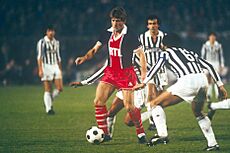
The Parisians played their first international match in the 1982–83 season. They qualified for the Cup Winners' Cup because they won the Coupe de France. Their first game was against Lokomotiv Sofia. They reached the quarter-finals, where they were knocked out by Waterschei Thor. PSG then played in the UEFA Europa League in the 1984–85 season. They took their first steps in Europe's biggest club competition, the Champions League, in the 1986–87 season.
Between 1992 and 1997, the club reached five European semi-finals in a row. They won their first European trophy by beating Rapid Wien in the 1996 UEFA Cup Winners' Cup final. This win allowed PSG to play in the UEFA Super Cup, where they lost to Juventus. They reached a second Cup Winners' Cup final in 1997, but lost to Barcelona. PSG played in the Intertoto Cup once in 2001. They won their second European trophy against Brescia in the final.
PSG reached their first Champions League final in 2020, losing to Bayern Munich. It was their first European final since 2001. They won their first Champions League title in 2025, defeating Inter Milan in the final. As European champions, PSG qualified for the FIFA Club World Cup, the UEFA Super Cup, and the FIFA Intercontinental Cup. They lost to Chelsea in the 2025 FIFA Club World Cup final, but won the Super Cup on penalties against Tottenham Hotspur.
PSG Supporters
Paris Saint-Germain is the most popular football club in France. About 22% of the country's football fans support them. With around 35 million fans, PSG is also one of the most followed teams in the world. The Parc des Princes has been their home stadium since July 1974. It has four main stands: Tribune Auteuil, Tribune Paris, Tribune Borelli, and Tribune Boulogne. Historically, the Auteuil and Boulogne stands were home to PSG's most passionate fans, called ultras. This made the Parc a very exciting place to watch a game. Other fan groups, who are more welcoming and family-friendly, gather in the Paris and Borelli stands. One of the first fan groups, Les Amis du PSG, started in 1975.
In 1976, the club started offering cheaper season tickets to young fans. These fans sat in Kop K, a section of the Paris stand. When ticket prices went up, these fans moved to the Boulogne stand in 1978, and the Kop of Boulogne was formed. The first ultra group, the Boulogne Boys, started there in 1985. However, some groups in the Boulogne stand caused problems.
To address these issues, the club's owners, Canal+, encouraged non-violent fans to gather at the other end of the stadium. This led to the creation of the Virage Auteuil in 1991. At first, this helped, but disagreements and issues slowly grew between the two stands. In 2010, before a match against Marseille, there was a serious incident outside the Parc. This led PSG president Robin Leproux to take action. In what was known as the Plan Leproux, the club temporarily removed all fan groups from the Parc and banned them from away matches to ensure safety. It took six years for the ultras to return to the stadium. Former Auteuil supporters formed the Collectif Ultras Paris (CUP) in May 2016. The club agreed to their return in October 2016.
The CUP, based in Auteuil, is currently the only officially recognized ultra group by the club. They share the stadium with other official groups. These include Hoolicool, Vikings 27, and Handicap PSG in the Paris stand. Les Amis du PSG, Titi Fosi, and PSG Grand Sud are in the Borelli stand. PSG allowed the CUP to take over the Boulogne stand for the 2025–26 season.
Club Rivalries
Le Classique: PSG vs. Marseille
Paris Saint-Germain has a strong rivalry with Olympique de Marseille. Matches between these two teams are known as Le Classique. They are the two most successful clubs in French football. They are also the only French teams to have won major European trophies. Because of this, their matches are considered the biggest rivalry in France.
PSG and Marseille were the top teams before Olympique Lyonnais became strong in the 2000s. They are also the most followed French teams around the world. Both clubs usually have the most fans attending their games each season. Their early matches in the 1970s did not suggest they would become such big rivals. PSG was a new team trying to become competitive, while Marseille was already a top team in Ligue 1.
The rivalry truly began in 1986. That year, PSG won their first championship, and Bernard Tapie bought Marseille. By the end of the 1980s, PSG was competing with Tapie's Marseille for the 1988–89 title. The growing competition between the club presidents added to the rivalry.
In the 1990s, the tension between the two teams grew. French TV channel Canal+ bought PSG in 1991. Their goal was to challenge Marseille's dominance. With similar financial support, PSG and Marseille became the main contenders for the league title. Both teams had less success in the late 1990s and 2000s, but the rivalry remained strong. Since the 2010s, PSG has been more dominant in these matches. The large investments from their Qatari owners have created a significant difference between the clubs.
Club Ownership and Finances
Paris Saint-Germain was first owned by its fans, with 20,000 members. The club was managed by board members Guy Crescent, Pierre-Étienne Guyot, and Henri Patrelle. A group of wealthy French businessmen, led by Daniel Hechter and Francis Borelli, then bought the club in 1973. PSG changed owners again in 1991 when Canal+ took over. Then, in 2006, Colony Capital became the owner. Qatar Sports Investments (QSI) has been the main owner of PSG since 2011. By 2012, they held 87.5% of the shares. Arctos Partners owns the remaining 12.5%.
QSI, supported by the Qatari government, bought most of the club in 2011. They became the sole owner in 2012. This means PSG is a state-owned club, making it one of the wealthiest teams in the world. In 2023, Arctos Partners bought a smaller share in the club. QSI chairman Nasser Al-Khelaifi has been PSG president since the takeover. However, Tamim bin Hamad Al Thani, the Emir of Qatar, makes the final decisions for the club. He is the chairman of the QIA and the founder of QSI.
When QSI arrived, they promised to build a team that could win the UEFA Champions League. PSG has spent billions of dollars on buying players since the summer of 2011. These large expenses have helped PSG dominate French football. They have also led to discussions about rules for how much clubs can spend.
In January 2025, PSG had the third-highest income in football worldwide. They earned €806 million, according to Deloitte. They were also the world's seventh-most valuable football club, worth $4.4 billion, according to Forbes magazine. This financial growth has been supported by PSG's Qatari owners. The team's success on the field, signing famous players like Zlatan Ibrahimović, Neymar, Kylian Mbappé, and Lionel Messi, and big sponsorship deals have all contributed.
Club Honours
| Type | Competitions | Titles | Seasons |
|---|---|---|---|
| Domestic | Ligue 1 | 13 | 1985–86, 1993–94, 2012–13, 2013–14, 2014–15, 2015–16, 2017–18, 2018–19, 2019–20, 2021–22, 2022–23, 2023–24, 2024–25 |
| Ligue 2 | 1 | 1970–71 | |
| Coupe de France | 16 | 1981–82, 1983, 1993, 1995, 1998, 2004, 2006, 2010, 2015, 2016, 2017, 2018, 2020, 2021, 2024, 2025 | |
| Coupe de la Ligue | 9 | 1995, 1998, 2008, 2014, 2015, 2016, 2017, 2018, 2020 | |
| Trophée des Champions | 13 | 1995, 1998, 2013, 2014, 2015, 2016, 2017, 2018, 2019, 2020, 2022, 2023, 2024 | |
| Continental | UEFA Champions League | 1 | 2025 |
| UEFA Cup Winners' Cup | 1 | 1996 | |
| UEFA Intertoto Cup | 1 | 2001 | |
| UEFA Super Cup | 1 | 2025 | |
| Worldwide | FIFA Intercontinental Cup | 1s | 2025 |
- record
- s shared record
Current Players
Team Squad
|
|
Players on Loan to Other Teams
|
|
Club Personnel
Club Management Team
Technical Staff for the Team
| Position | Name |
|---|---|
| First-team head coach | |
| Assistant coach | |
| Assistant coach | |
| Psychologist | |
| Fitness coach | |
| Assistant fitness coach | |
| Goalkeeper coach | |
| Assistant goalkeeper coach |
See also
 In Spanish: Paris Saint-Germain Football Club para niños
In Spanish: Paris Saint-Germain Football Club para niños
 | DeHart Hubbard |
 | Wilma Rudolph |
 | Jesse Owens |
 | Jackie Joyner-Kersee |
 | Major Taylor |


